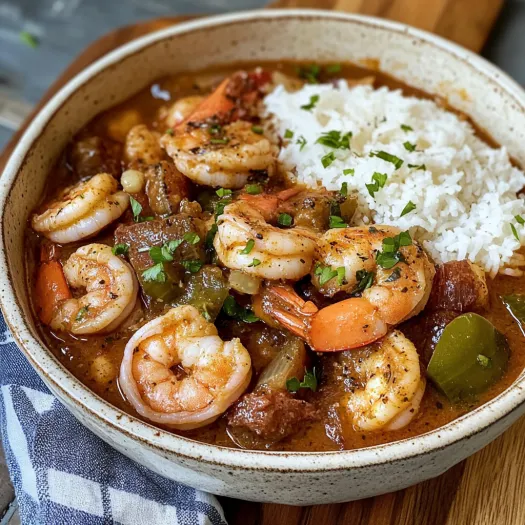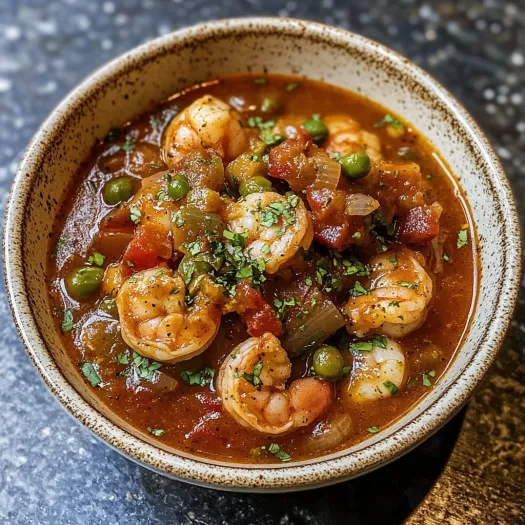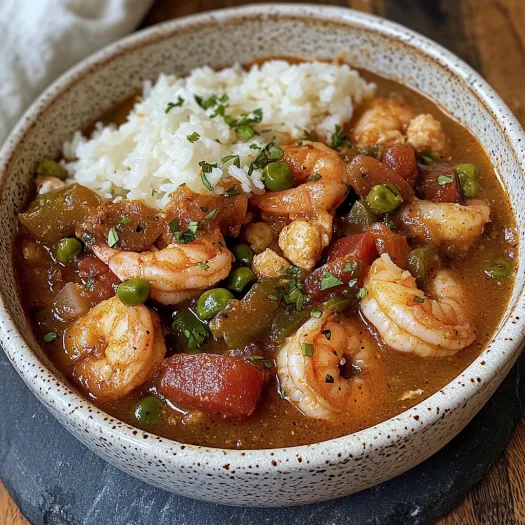 Pin
Pin
This rich shrimp gumbo brings the authentic flavors of Louisiana right to your dinner table. The combination of a perfectly browned roux, tender shrimp, and smoky andouille sausage creates a depth of flavor that makes this dish truly special. After years of perfecting this recipe, I can promise this will become your go-to comfort food on chilly evenings.
I first learned to make gumbo from my neighbor who grew up in New Orleans. She taught me that patience with the roux is everything, and now this recipe has become my signature dish whenever friends visit from out of town.
Ingredients
- Andouille sausage: Brings that essential smoky flavor that makes gumbo distinctive
- Peanut oil: Works perfectly for making the roux as it has a high smoke point
- Flour: Combines with oil to create the roux that gives gumbo its signature body and flavor
- Bell pepper, onion, and celery: Form the "holy trinity" of Cajun cooking that provides the aromatic base
- Garlic: Adds depth and warmth to the overall flavor profile
- Cajun seasoning: Brings authentic Louisiana flavor with its blend of paprika, thyme, oregano, and other spices
- Seafood stock: Provides a rich foundation that complements the shrimp beautifully
- Fresh okra: Serves as a natural thickener while adding traditional gumbo texture
- Parsley: Brightens the rich flavors with its fresh, herbaceous notes
- Shrimp: Should be fresh and properly deveined for the best texture and flavor
- Filé powder: Optional but authentic, adding a subtle earthy flavor and extra thickening power
Step-by-Step Instructions
- Brown the Andouille:
- Heat a teaspoon of olive oil in your Dutch oven over medium heat until it shimmers. Add the sliced andouille and cook for about 2 minutes per side until they develop a deep brown crust. This step creates a foundation of flavor that will infuse throughout the gumbo. Remove and set aside while you prepare the roux.
- Make the Roux:
- Add peanut oil to your pot and heat to medium. Sprinkle in the flour gradually while stirring continuously. This is the most crucial part of gumbo making. For the next 20 to 30 minutes, you must stir constantly to prevent burning. Watch as the mixture transforms from pale beige to the color of milk chocolate. The darker your roux, the richer the flavor but less thickening power it will have.
- Cook the Trinity:
- Add your chopped bell pepper, onion, celery, and garlic to the roux. The vegetables will sizzle and begin to soften as they hit the hot roux. Cover and cook for about 5 minutes, stirring occasionally. The vegetables will release moisture and begin to soften while absorbing the rich flavor of the roux.
- Bloom the Spices:
- Return the browned andouille to the pot and add your Cajun seasoning with salt and pepper. Stir continuously for one full minute. This brief cooking time allows the spices to bloom, releasing their essential oils and maximizing their flavor contribution to the dish.
- Add Liquid and Simmer:
- Pour in the seafood stock, using your spoon to scrape all the browned bits from the bottom of the pot. These bits contain concentrated flavor. Bring the mixture to a boil, then reduce to a medium low simmer. Allow the gumbo to cook uncovered for a full hour, stirring occasionally as it thickens and the flavors meld together.
- Add Vegetables:
- Stir in the sliced okra and chopped parsley. The okra will help thicken the gumbo naturally while adding authentic texture. Let this simmer for 15 minutes to allow the okra to cook through and release its thickening properties.
- Add Shrimp:
- Gently stir in the shrimp, tucking them into the hot liquid. Cook for just 6 to 7 minutes until the shrimp turn pink and opaque. Be careful not to overcook the shrimp as they can become tough and rubbery.
- Finish and Serve:
- Remove from heat and stir in filé powder if using. Ladle the gumbo into bowls over white rice if desired, and garnish with extra fresh parsley. The contrast of the dark gumbo against the white rice is not just visually appealing but traditional.
 Pin
Pin
My grandmother always said the secret to great gumbo is in the patience of the roux. She would stand by the stove with her wooden spoon for what felt like hours, telling stories about growing up in Louisiana. That methodical stirring became a meditative practice I now cherish whenever I make this recipe.
Roux Variations
The color of your roux dramatically affects your gumbo's flavor and consistency. A lighter peanut butter colored roux will produce a thicker gumbo with milder flavor, perfect for those new to Cajun cuisine. A dark chocolate roux creates a thinner but intensely flavored gumbo that true enthusiasts prefer. For beginners, aim for a medium roux the color of copper or milk chocolate. This gives you both good thickening power and rich flavor without the risk of burning the roux.
Make-Ahead Options
Gumbo actually improves with time as the flavors continue to develop and meld. You can make this recipe up to three days ahead, stopping before adding the shrimp. Store the base in the refrigerator, then reheat gently and add fresh shrimp just before serving. For longer storage, freeze the base in airtight containers for up to three months. The texture of the okra may change slightly upon thawing, but the flavor remains exceptional.
 Pin
Pin
Serving Traditions
In Louisiana, gumbo is traditionally served over a small mound of white rice, which helps absorb the flavorful liquid. Hot sauce is almost always present on the table, allowing each person to adjust the heat level to their preference. For an authentic experience, serve with a side of crusty French bread for sopping up every last bit of the rich broth. Some families also offer filé powder at the table so individuals can add extra thickening and flavor as desired.
Frequently Asked Questions About the Recipe
- → What is the key to making a good roux for gumbo?
The key to a good gumbo roux is patience and constant stirring. Cook the flour and oil mixture over medium heat for 20-30 minutes until it reaches the color of light chocolate. Never stop stirring to prevent burning. The darker the roux, the more flavor it will have, though a lighter peanut-butter colored roux will produce a thicker gumbo.
- → Can I substitute the andouille sausage with something else?
Yes, you can substitute andouille with other smoked sausages like kielbasa or chorizo. For a less spicy option, smoked turkey sausage works well. Each alternative will bring a slightly different flavor profile, but will still create a delicious gumbo.
- → What can I use instead of seafood stock?
Chicken stock or vegetable stock make excellent substitutes for seafood stock in this gumbo. Chicken stock will provide a rich flavor base, while vegetable stock offers a lighter alternative. You can also use water with seafood bouillon or clam juice diluted with water for a seafood flavor.
- → What is filé powder and is it necessary?
Filé powder is ground sassafras leaves used as a thickening agent and flavor enhancer in Cajun cooking. It's optional in this gumbo since the okra already provides thickening. If you do use it, add it after cooking as extended heat can make it stringy. It adds an earthy, unique flavor that some consider essential to authentic gumbo.
- → Can I make this gumbo ahead of time?
Gumbo actually improves with time as flavors meld together. You can make it 1-2 days ahead and refrigerate. For best results, prepare the base without the shrimp, then add and cook the shrimp just before serving to prevent overcooking. Gumbo also freezes well for up to 3 months (again, without the shrimp).
- → What vegetables can I add to my gumbo?
Beyond the traditional 'holy trinity' of bell peppers, onions, and celery, you can add diced tomatoes, corn, or different colored bell peppers. Some cooks add greens like collards or kale near the end of cooking. While not traditional, these additions can increase nutritional value and add texture to your gumbo.
